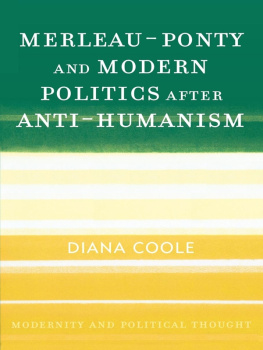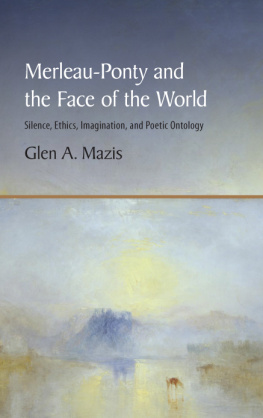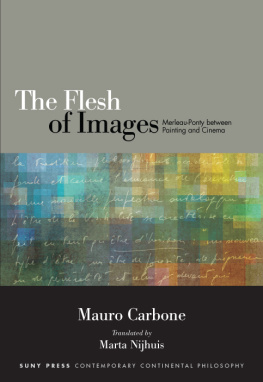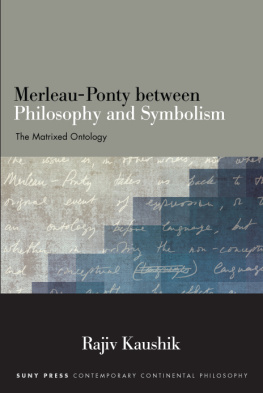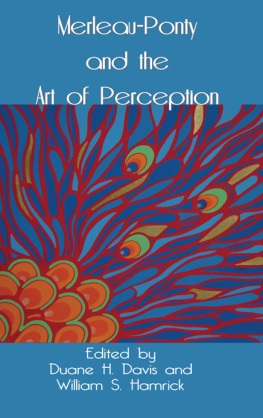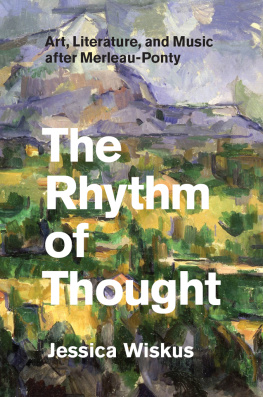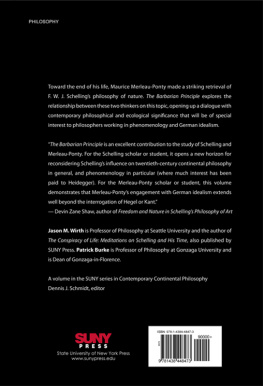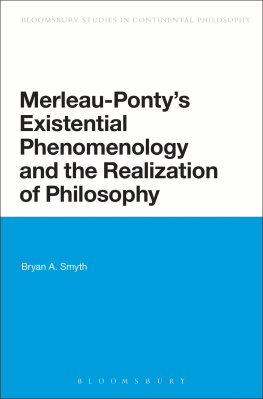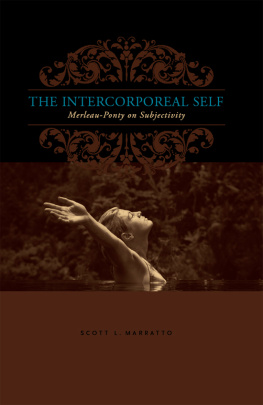Beith Don - The birth of sense: generative passivity in Merleau-Pontys philosophy
Here you can read online Beith Don - The birth of sense: generative passivity in Merleau-Pontys philosophy full text of the book (entire story) in english for free. Download pdf and epub, get meaning, cover and reviews about this ebook. City: Athens (Ohio, year: 2018, publisher: Ohio University Press, genre: Science. Description of the work, (preface) as well as reviews are available. Best literature library LitArk.com created for fans of good reading and offers a wide selection of genres:
Romance novel
Science fiction
Adventure
Detective
Science
History
Home and family
Prose
Art
Politics
Computer
Non-fiction
Religion
Business
Children
Humor
Choose a favorite category and find really read worthwhile books. Enjoy immersion in the world of imagination, feel the emotions of the characters or learn something new for yourself, make an fascinating discovery.

- Book:The birth of sense: generative passivity in Merleau-Pontys philosophy
- Author:
- Publisher:Ohio University Press
- Genre:
- Year:2018
- City:Athens (Ohio
- Rating:4 / 5
- Favourites:Add to favourites
- Your mark:
- 80
- 1
- 2
- 3
- 4
- 5
The birth of sense: generative passivity in Merleau-Pontys philosophy: summary, description and annotation
We offer to read an annotation, description, summary or preface (depends on what the author of the book "The birth of sense: generative passivity in Merleau-Pontys philosophy" wrote himself). If you haven't found the necessary information about the book — write in the comments, we will try to find it.
Beith Don: author's other books
Who wrote The birth of sense: generative passivity in Merleau-Pontys philosophy? Find out the surname, the name of the author of the book and a list of all author's works by series.
The birth of sense: generative passivity in Merleau-Pontys philosophy — read online for free the complete book (whole text) full work
Below is the text of the book, divided by pages. System saving the place of the last page read, allows you to conveniently read the book "The birth of sense: generative passivity in Merleau-Pontys philosophy" online for free, without having to search again every time where you left off. Put a bookmark, and you can go to the page where you finished reading at any time.
Font size:
Interval:
Bookmark:
The Birth of Sense
SERIES IN CONTINENTAL THOUGHT
Editorial Board
Ted Toadvine, Chairman, University of Oregon
Michael Barber, Saint Louis University
Elizabeth A. Behnke, Study Project in Phenomenology of the Body
David Carr, Emory University
James Dodd, New School University
Lester Embree, Florida Atlantic University
Sara Heinmaa, University of Jyvskyl, University of Helsinki
Jos Huertas-Jourda, Wilfrid Laurier University
Joseph J. Kockelmans, Pennsylvania State University
William R. McKenna, Miami University
Algis Mickunas, Ohio University
J. N. Mohanty, Temple University
Dermot Moran, University College Dublin
Thomas Nenon, University of Memphis
Rosemary Rizo-Patron de Lerner, Pontificia Universidad Catlica del Per, Lima
Thomas M. Seebohm, Johannes Gutenberg Universitt, Mainz
Gail Soffer, Rome, Italy
Elizabeth Strker, Universitt Kln
Nicolas de Warren, Katholieke Universiteit Leuven
Richard M. Zaner, Vanderbilt University
International Advisory Board
Suzanne Bachelard, Universit de Paris
Rudolf Boehm, Rijksuniversiteit Gent
Albert Borgmann, University of Montana
Amedeo Giorgi, Saybrook Institute
Richard Grathoff, Universitt Bielefeld
Samuel Ijsseling, Husserl-Archief te Leuven
Alphonso Lingis, Pennsylvania State University
Werner Marx, Albert-Ludwigs Universitt, Freiburg
David Rasmussen, Boston College
John Sallis, Boston College John Scanlon, Duquesne University
Hugh J. Silverman, State University of New York, Stony Brook
Carlo Sini, Universit di Milano
Jacques Taminiaux, Louvain-la-Neuve
D. Lawrence Wieder
Dallas Willard, University of Southern California
The Birth of Sense
Generative Passivity in Merleau-Pontys Philosophy
Don Beith
OHIO UNIVERSITY PRESS
ATHENS
Ohio University Press, Athens, Ohio 45701
ohioswallow.com
2018 by Ohio University Press
All rights reserved
To obtain permission to quote, reprint, or otherwise reproduce or distribute material from Ohio University Press publications, please contact our rights and permissions department at (740) 593-1154 or (740) 593-4536 (fax).
Printed in the United States of America
Ohio University Press books are printed on acid-free paper 
28 27 26 25 24 23 22 21 20 19 18 5 4 3 2 1
Library of Congress Cataloging-in-Publication Data
Names: Beith, Don, author.
Title: The birth of sense : generative passivity in Merleau-Pontys philosophy / Don Beith.
Description: Athens, Ohio : Ohio University Press, 2018. | Series: Series in Continental thought ; No. 52 | Includes bibliographical references and index.
Identifiers: LCCN 2018000072 | ISBN 9780821423103 (hc : alk. paper) | ISBN 9780821446263 (pdf)
Subjects: LCSH: Merleau-Ponty, Maurice, 1908-1961.
Classification: LCC B2430.M3764 B45 2018 | DDC 194dc23
LC record available at https://lccn.loc.gov/2018000072
Dedicated to an especial teacher, authentic friend, and generative philosopher: John Russon
Rhythm and melody supply imitations of anger and gentleness, and also of courage and temperance, and of all the qualities contrary to these, and of the other qualities of character, which hardly fall short of the actual affections, as we know from our own experience, for in listening to such strains our souls undergo a change.... There seems to be in us a sort of afnity to musical modes and rhythms, which makes some philosophers say that the soul is a harmony.
Aristotle, Politics 8
Nature loves to hide.
Heraclitus, Fragment 123
All action is an invasion of the future, of the unknown.
John Dewey, Human Nature and Conduct
Birth [is not an act] of constitution but the institution of a future. Reciprocally, institution resides in the same genus of Being as birth and is not, any more than birth, an act: there will be later decisionary institutions or contracts, but they are to be understood on the basis of birth and not the reverse.
Therefore [there is an] instituted and instituting subject, but inseparably, and not a constituting subject; [therefore] a certain inertia[the fact of being] exposed to... but [this is what] puts an activity en route, an event, the initiation of the present, which is productive after itGoethe: genius [is] posthumous productivitywhich opens a future.
The subject [is] that to which such orders of events can advent, field of fields.
Maurice Merleau-Ponty, Institution
CONTENTS
ACKNOWLEDGMENTS
Many excellent philosophers have helped to shape this project. I am thankful to John Russon, to whom this book is dedicated, for provocative conversations, particularly one Socratic walk around Toronto where he got me thinking about three levels of passivity in Merleau-Pontys thinking. Alia Al-Saji, for whom phenomenology is a rigorous science, has been an exceptional writing mentor, leading me to insights about temporality in Bergson and Merleau-Ponty. A natural phenomenologist, David Morris has challenged me to think of being in terms of development. Discovering Ted Toadvines deep work on nature was a pivotal moment in my learning, and I thank him for his many insightful comments on this work. I am indebted to Anthony Steinbock for sharing his original investigations at the Phenomenology Research Center, for challenging me to think about personhood, and particularly for his work on generative method in Husserl, out of which I develop the tripartite interpretative method of this study. Thanks are also due to thinkers who challenged me to think more deeply about nature, difference, and expression: Iain Macdonald, Cynthia Willett, Lisa Guenther, Doug Anderson, Hasana Sharp, George di Giovanni, Sunny Wang, Carolina Bergonzoni, William Ross Kemperman, Daniel Elliotte Allan, Zain Raza, Sarah McLay, Meghant Sudan, Donncha Coyle, Thomas Minguy, Filip Niklas, Ivanna Besenovsky, Jack Marcotte, and Jingjing Li.
Inspiring colleagues have supported me and shared their passion with teaching over the years at Bishops University, the University of British Columbia, and the University of Maine, especially Kirsten Jacobson, Jessica Miller, Roger King, James Crooks, Bruce Gilbert, Steven Taubeneck, Scott Anderson, and Noah Moss Brender.
I am grateful to John Russon for his outstanding teaching and work to lead vigorous philosophical seminars on the history of philosophy, where I discovered the inspiration to study philosophy and was introduced to a world of philosophers. I owe more than I can say to the participants of the Toronto Seminar for formative discussions over the years, especially Nate Andersen, Joe Arel, mer Aygn, Susan Bredlau, Noah Moss Brender, Tim Brownlee, David Ciavatta, Patricia Fagan, Tim Fitzjohn, Bruce Gilbert, Shannon Hoff, Whitney Howell, Kirsten Jacobson, Greg Kirk, Kym Maclaren, Scott Marratto, Laura McMahon, David Morris, Jeff Morrisey, Eve Rabinoff, Greg Recco, Bryan Richard, Karen Robertson, Eric Sanday, Jacob Singer, Maria Talero, and Ollie Wiitala.
Deep thanks to the two anonymous reviewers who provided a wealth of philosophical resources and perspectives on the lacunae in this work. Thanks also to the tireless work of the staff and editors at Ohio University Press, particularly Rick Huard, Deborah Wiseman, and Ted Toadvine. I am indebted to Leonard Lawlor for sharing an early draft of his translation of Institution and Passivity with a small group of dedicated Merleau-Ponty scholars in Montreal in the winter of 2010. It was a gift to have had the colleagues of an informal Merleau-Ponty institution as interlocutors for several years in Montreal: merci beaucoup, Shiloh Whitney, Noah Moss Brender, David Morris, Tristana Martin Rubio, Lisa Guenther, Don Landes, and Dan Landreville.
Next pageFont size:
Interval:
Bookmark:
Similar books «The birth of sense: generative passivity in Merleau-Pontys philosophy»
Look at similar books to The birth of sense: generative passivity in Merleau-Pontys philosophy. We have selected literature similar in name and meaning in the hope of providing readers with more options to find new, interesting, not yet read works.
Discussion, reviews of the book The birth of sense: generative passivity in Merleau-Pontys philosophy and just readers' own opinions. Leave your comments, write what you think about the work, its meaning or the main characters. Specify what exactly you liked and what you didn't like, and why you think so.

